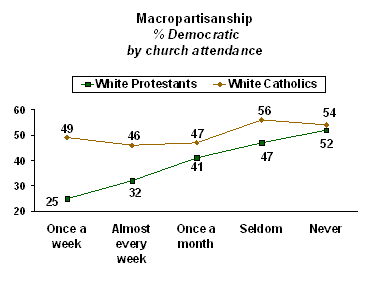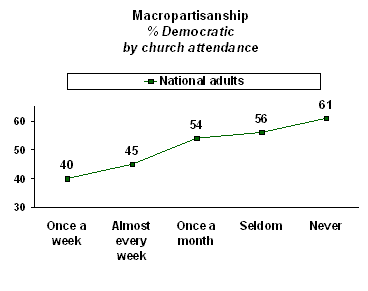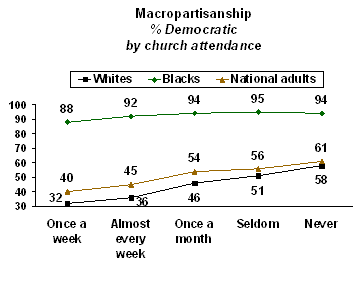GALLUP NEWS SERVICE
PRINCETON, NJ -- There is a strong correlation in America today between one's religiosity and one's political status. This political status includes both the political party with which one identifies as well as the candidate for whom one votes.
Gallup's final survey conducted before the 2004 election estimated that 63% of voters who attended church weekly or almost every week voted for Bush; 37% voted for Kerry. Sixty percent of those who seldom or never attended church indicated a vote choice for Kerry; 40% voted for Bush. The same directional patterns have been observed between self-reported importance of religion and vote choice.
There was a good deal of interest in this connection between religion and politics last year. But it is not a totally new phenomenon. In 2000, 54% of those who attended church weekly or almost weekly voted for Bush, while 37% voted for Gore. Gallup surveys indicated that in both 1992 and 1996, Bill Clinton did better than his opponent among those who seldom or never attended church.
In short, religious Americans skew strongly toward voting for the Republican candidate for president. Highly religious white Protestant or non-Catholic Americans in particular skew strongly toward the Republican candidate. Black Americans are very much the exception; they skew heavily toward the Democratic candidate, regardless of their religiosity.
This review focuses not on the vote in a particular election, but rather, on partisan identification. The analysis is based on a very large aggregated sample of almost 30,000 Gallup Poll interviews conducted in 2004, in which questions about church attendance were included.
Church Attendance and Partisan Identification
The table displays the percentage of those in each church attendance category who identify with the two major parties or are independents. It also displays a difference score based on the percentage of Democrats minus the percentage of Republicans, and a calculated value of "macropartisanship." This last variable is based on the percentage of those who identify as Democrats divided by the percentage who identify as either Democrats or Republicans. The macropartisanship variable, in short, is a convenient way of expressing how Democratic in orientation a given group is.
|
Partisanship by Church Attendance |
|||||
|
|
Republican |
Independent |
Democrat |
% Dem – % Rep |
Macro- |
|
% |
% |
% |
pct. pts. |
|
|
|
Once a week |
45% |
25% |
30% |
-15 |
40 |
|
Almost every week |
40 |
27 |
33 |
-8 |
45 |
|
Once a month |
32 |
31 |
37 |
5 |
54 |
|
Seldom |
29 |
34 |
37 |
8 |
56 |
|
Never |
22 |
43 |
35 |
13 |
61 |
Here's this same relationship presented graphically.

The basic pattern is clear. Americans who attend church frequently are significantly more likely to be Republicans and less likely to be Democrats than those who attend church less frequently. Note also that Americans who never attend church are significantly more likely to say they have no partisan choice (i.e., are independent) than are those who attend church, even infrequently.
These data are for all Americans, regardless of race, creed, or color. Numerous studies have shown, however, that being black is one of the strongest available predictors of identifying with the Democratic Party. Gallup data also show that blacks are very religious. Therefore, the strong positive relationship between church attendance and identification with the Republican Party as presented above is actually attenuated somewhat because the black respondents included in the dataset have the opposite relationship.
The table on church attendance and race corrects for this problem by separating whites and blacks into two samples.
|
Partisanship by Church Attendance and
Race |
||||||
|
Race |
Church |
Rep |
Ind |
Dem |
% Dem – % Rep |
Macro- |
|
% |
% |
% |
pct. pts. |
|
||
|
White |
Once a week |
51 |
25 |
24 |
-27 |
32 |
|
Almost every week |
46 |
28 |
26 |
-20 |
36 |
|
|
Once a month |
37 |
31 |
31 |
-6 |
46 |
|
|
Seldom |
32 |
34 |
33 |
1 |
51 |
|
|
Never |
24 |
43 |
33 |
9 |
58 |
|
|
|
|
|
|
|
||
|
Black |
Once a week |
9 |
25 |
65 |
56 |
88 |
|
Almost every week |
6 |
22 |
71 |
65 |
92 |
|
|
Once a month |
5 |
23 |
72 |
67 |
94 |
|
|
Seldom |
4 |
26 |
70 |
66 |
95 |
|
|
Never |
4 |
38 |
58 |
55 |
94 |
|
The basic relationship between church attendance and partisanship for whites follows the same pattern as is observed for the total sample -- not surprising, given that whites constitute the significant majority of the total population.
Among blacks, the relationship isn't strong, principally because blacks are overwhelmingly Democratic regardless of church attendance. Still, there is a slight tendency for blacks who attend once a week to be less Democratic than those who attend less often. Also, blacks who never attend church are more likely to be independents than are those who attend at least occasionally.

Church Attendance and Partisanship: White Protestants and White Catholics
A major focus of the analysis of religion's impact on politics is evangelical Protestants, who are widely assumed to be significantly different from Catholics and other Protestants in the way in which their religion is manifested in their daily lives and actions. For the purpose of analysis, this table shows the relationship between church attendance and partisanship only among white Protestants.
|
Partisanship by Church
Attendance |
|||||
|
Church attendance |
Rep |
Ind |
Dem |
% Dem – % Rep |
Macro- |
|
% |
% |
% |
pct. pts. |
|
|
|
Once a week |
60 |
21 |
20 |
-40 |
25 |
|
Almost every week |
50 |
26 |
24 |
-26 |
32 |
|
Once a month |
43 |
27 |
30 |
-13 |
41 |
|
Seldom |
37 |
30 |
33 |
-4 |
47 |
|
Never |
31 |
37 |
33 |
2 |
52 |
The relationship pattern here is the same as the one observed for the total sample, but one that reflects white Protestants' tendency across the board to be even more Republican in orientation. Four of the five church attendance groups are less than 50% Democratic (based on the macropartisanship measure). Only the group who "never" attends services is slightly more Democratic than Republican. The proportion of white Protestants who attend church weekly is remarkably Republican, as can be seen.
What about white Catholics?
|
Partisanship by Church Attendance |
|||||
|
Church attendance |
Rep |
Ind |
Dem |
% Dem – % Rep |
Macro- |
|
% |
% |
% |
pct. pts. |
|
|
|
Once a week |
38 |
27 |
36 |
-2 |
49 |
|
Almost every week |
39 |
27 |
34 |
-5 |
47 |
|
Once a month |
37 |
31 |
32 |
-5 |
46 |
|
Seldom |
29 |
33 |
38 |
9 |
57 |
|
Never |
31 |
33 |
36 |
5 |
54 |
The relationship between church attendance and partisanship is flatter among white Catholics than is the same relationship among white Protestants. There is little difference in the macropartisanship variable among Catholics who attend church weekly, almost every week, or once a month. But those who attend less frequently -- seldom or never -- do move somewhat above the 50% mark.

Overall, the spread in the macropartisanship score between the group of Catholics who are most likely to be Republicans and the group who are most likely to be Democrats is just 11 points. Among white Protestants, macropartisanship ranges between 25% and 52%, a spread of 27 points.
In other words, there is a very strong relationship between frequency of church attendance and identifying with the Republican Party among white Protestants, and a much more muted such relationship among Catholics, who tend to be significantly more Democratic in orientation across the board.
Survey Methods
Results are based on telephone interviews with 29,575
national adults, aged 18 and older, aggregated from various surveys
conducted from January to December 2004. The margin of sampling
error varies, depending on the sample size. In addition to sampling
error, question wording and practical difficulties in conducting
surveys can introduce error or bias into the findings of public
opinion polls.
